How could we build a viable alternative to the current, bank-controlled money system? Interview with Matthew Slater of the Credit Commons Collective
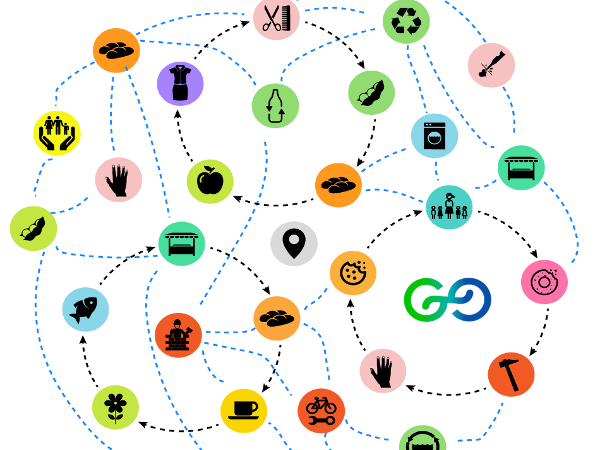
This week we’re talking with Matthew Slater of the Credit Commons Collective, working to build a mutualist, credit-based alternative to the current money system. Here’s an introduction to the idea. We’re going to be working with Matthew, Open.coop, the Permaculture Association and Thomas Greco, author of the End of Money and the Future of Civilisation to attempt to build a national mutual credit trading scheme. Let’s find out what Matthew’s up to.
What do you do?
Having spent a lot of time building software for LETS systems, and encouraging people to use it, I now focus more on the nature of money and the design of monetary systems, including sometimes cryptocurrencies. All the funding/investment/attention is on cryptocurrencies at the moment.
Why the switch?
Because it seemed to me that very few people had an understanding of the money system – not even economists. I was unearthing it and identifying how much of it is ideologically driven, and how there are huge misunderstandings and misapplications of language. It seemed that what we’re really describing with the money system is two or three simple mechanisms that all seem to get mixed up. So I set about trying to work out what those mechanisms were. I think I have a pretty good idea now.
How did you get into all this? What sparked your interest?
The paradox. I just couldn’t work it out at first. I wanted to write a configuration page for my LETS software. Each system has its own currency, so I wanted to make them configurable – but I couldn’t work out what the configuration options were. There were various competing theories about how money works and what it is. Then I fell down the rabbit-hole.
What was the entrance to the rabbit-hole?
I started with an animation called ‘Money as Debt’, and then someone pointed me towards ‘Money Masters’, which alleged that in the history of the US, there’s been a constant to-ing and fro-ing between public money and central bank private money. That alerted me to the political battle and how it lay behind a tremendous amount of politics and warfare.
What do you mean by ‘to-ing and fro-ing’?
When the US was founded, after the revolution, they created a Bank of the United States, which lasted few years, then collapsed. Then everyone issued their own money, and it was arguably a bit chaotic. Then they had a second Bank of the United States, then Jefferson, the president, staked his reputation on trying to kill this second bank, because it was centralising money and power, and there was no liquidity in the economy – it wasn’t serving the ordinary farmers and workers. The second bank eventually died, there was a ‘free banking’ era, then they had ‘greenbacks’ – government issued money. Then the banks, with a heavy propaganda effort, managed to create the Federal Reserve in 1913, so back onto a centralised, private money system.
That’s an awful lot of to-ing and fro-ing. Now there’s the Federal Reserve, which isn’t government money, it’s a consortium of private banks. So most of the world now is on that system, which actually started with the Bank of England in 1694.
What are you working on that could create a viable alternative?
I’ve written a paper that describes how we could use the same monetary model as LETS, and scale it up to run the whole economy.
Can you briefly explain the LETS model?
It’s a group of people who live in the same vicinity, doing things for each other, then marking up what they do, either in terms of time spent, or units of value that they decide between them, on a ledger, and then balancing what they do for each other with what they receive from each other. The balance is key. If a person, or a country, or any entity balances what it gives and what it receives to the economy it’s in, it doesn’t need money – it just needs to keep a record of what it does and what it receives.
But LETS didn’t really take off though, did it?
It succeeded in its own way. It certainly didn’t take over the economy.
So how would you like to use that model to take over the economy?
I’ve got one project that’s about bringing all the LETS schemes together into one decentralised system. That involves enabling them to pay each other, by setting up a system of exchange rates and internet protocols, so that a local group can have its own monetary policy and its own currency, and it can trade with other local groups. But that’s only a matter of scaling the LETS. I’ve taken the idea to the business barter networks, and they don’t seem very interested.
What are the business barter networks?
They’re a bit like LETS, but with businesses in. So a business barter system will have maybe 100, or even 500 businesses in it. Those businesses will buy and sell from each other. And they will agree to only buy and sell as much as they can sell and buy. So because each one is balancing their trade, at least within the network, they don’t need money.
What kinds of businesses?
In principle it could be any kind of business, but a network needs to consist of businesses that supply each other – so they’ll be a network of related businesses, from any sector.
Are we talking sole traders, or large businesses?
Business barter networks tend to be small businesses, and some sole traders. But big businesses do similar things. There’s a mechanism called counter trade, where big businesses, especially in different countries, will pledge to supply each other with commodities of equal value, and by doing so, they don’t need money to pay, but they also reduce their exchange rate risk, because they’re pricing each other’s goods in their own commodities – i.e. their own produce.
So could what you’re trying to do be based on a combination of existing LETS systems and existing business barter networks, if you could persuade them to get involved – or would you have to build new systems from scratch?
It’s generally not the priority of those existing groups to do this sort of thing. A lot of them are focused on being local, and therefore they miss the wider, systemic implications.
And you haven’t been able to communicate those implications?
I’ve explained it to some, and some get it, but not sufficiently to elicit their interest and money to actually build it. We’re trying to raise funds to build it now. But I think that climate change now means that we don’t have time to bang our heads against brick walls – we have to work with people who get it and want to be involved. We are still involved with education though.
What are you doing as regards education?
My friend Prof. Jem Bendell and I made a massive, open, online course (MOOC) on ‘Money & Society’. It runs every 6 months, and around 150 people take it, from all over the world. Unfortunately, one’s just started, but there will be another early next year. It’s an exploration of the phenomenon of money, covering the nature of money, the history of money, the psychological, sociological and economic aspects of money, and finally, alternatives to the current money system.
Do you think if you can get traction with your idea, it could potentially grow to encompass the entire economy?
Yes, in that the model is scaleable. But a lot of models are scaleable. There are many ways in which we could fix the world, but it’s about doing what’s politically possible, in any political domain.
So what are the main obstacles that you face?
I don’t have a strong media presence. And also, there’s a general feeling that people are not interested in economics, and they don’t realise how it could be a key leverage point for turning human history around.
Then there are political obstacles, because it will mean redistributing wealth, and the people with the wealth don’t want it to be redistributed; and their wealth gives them the power to prevent it being redistributed. Maybe this is the only real obstacle.
How might we overcome these obstacles?
We can concentrate on what we can do ourselves, with each other. Sure, the government could change policy and it would change everything, but that doesn’t seem very likely, despite some progress by Positive Money in that field. They’ve been advocating for several years for a change to the money system – just working on the edge of what’s politically possible. So they’re pushing the Overton Window. They’ve had some good exposure, and done some useful work in explaining things. For example, they produced a book called Where does Money Come From? which was original research, with the Bank of England and some economists to actually trace how money is created in the bowels of the Bank of England. That was very valuable. They also did some good research, where they discovered that only 10% of MPs understand money creation. They carry out effective media campaigns and they have some good donors supporting them.
So theirs is a top-down approach, which needs doing, but the chances of it succeeding are very small. We need to be getting on with what we can do ourselves.
How do we take this forward? What are the next steps?
What’s needed is a commitment by people who want to see this happen, to trade with each other. When they’ve made that commitment, they can replace their use of pounds with short-term, low-risk, low-quantity credit that they can issue to each other. It’s based on solidarity. You guarantee that you’ll be a customer of other businesses in your network, and others will do the same for you. When buying anything, you give priority to others in your trading group. It can be good for business, because you get a group of loyal customers, because you have this common purpose.
What kind of businesses are you thinking might be interested?
Any business that has an explicit or implicit agenda to make the world a better place. But it could work in all sectors of the economy. In some sectors, it would be better if those businesses were close to each other – so if you had several in the same town, that would be good. But products can also be shipped, or they could provide things that people travel to, like holidays or courses; or things that can be provided online, like web design or online courses, or things that can be delivered without shipping, like electricity or phone services.
In the Low-impact Network, we have over 500 business that do all sorts of things, from growing food, making clothes and constructing buildings to providing courses, craft products or renewable energy installations. That might be a good place to recruit people.
Definitely. And those people are likely to want to purchase from each other – as in, they may have similar values if they’re part of a ‘low-impact’ network.
I guess. And I know a lot of them would be interested in something that could bring about change, as well as being good for their business.
Many businesses object to joining such schemes because they see it as more paperwork and more complications. But business barter networks already exist, and they have hundreds of thousands of members all over the world – so it’s doable.
But business barter network members are probably not so interested in wider change?
They offer each other ‘trade credits’, as they call it – and it helps them specifically in moving surplus stock. So for example if you have a restaurant with 15 tables, and only 5 are booked on a monday night, you can offer tables to members of your network for trade credits, and you can utilise resources that otherwise wouldn’t have been used. That’s the main selling point for them, I think.
We blogged an article earlier in the year by Eloise Sentito of the Green Cloth Collective. They find it difficult, because they make textiles, by spinning, weaving and dyeing organic materials produced in the UK, like flax, wool and hemp. But because of the labour-intensive nature of the work, and because that work isn’t done in exploitative sweatshops, and because the raw materials are more expensive because they’re not so environmentally damaging (this should be the other way around, but it never is), their textiles turn out quite expensive, and therefore difficult to sell. So if they were trading with other ethical businesses whose output was similarly expensive, it might work out well, because they’re trading – it doesn’t really matter about the price, if both sides are providing and obtaining quality stuff.
Technically it’s still more expensive, but it’s easier and cheaper to earn the money, because other people are earning the money through their surplus capacity. So they’ve got this extra income that they otherwise wouldn’t have, and they need to spend it in the network, so they can afford quality, ethical products. Also, it’s cheaper because you’re paying with your produce, not with the money from your sold produce – and you’d have to do a lot more work, advertising etc. to sell stuff that way.
Isn’t the state going to want to tax this?
Yes. It’s taxable like everything else. Even though you don’t receive official currency, you have to pay tax as if you did. It means that it’s difficult under the law currently, to do 100% of your trade in mutual credit. You need some official currency to pay tax, not to mention all the other things you need that can’t be obtained via your mutual credit network. Businesses in networks like these will typically only do a fraction of their trade within the network.
So if this idea grew to comprise the entire economy, how might the tax system work then?
The tax system is perfectly capable, if the will is there, of accepting trade credits as tax. There would need to be a government account in the system too. It would also mean that the government wouldn’t be able to spend its tax money on armaments, unless there were weapons manufacturers in the network.
But we’re not trying to be that ambitious at the moment. Baby steps for now. We’re trying to move in the right direction. We don’t know what the end result will look like.
What are the practicalities of this, for a lay person?
Most people will experience it as a website, or maybe an app on their phone. When you want to buy something, you find it in the directory, contact the person, order the goods, then you go back to the website and fill in a little form, and it debits your account and credits their account.
Who’s going to build this website, app, directory etc.?
There are commercial systems available. I’m working on open source tools. When we’re a bit readier to start, we’ll look at the landscape and make a choice based on how much money’s available, the business model and various other things. The first thing to do is to build a network of businesses who want to participate, including a list of things that they provide.
So if we start recruiting these businesses, what sort of timescale are we looking at for getting them trading?
Well they could start immediately – even before the website is ready, if they kept a record themselves. I also have software that can be used now. It was developed for LETS systems rather than businesses, but it could be used. I guess we’ll have to talk when we have a network.
How many businesses in that network before we get to that point?
Don’t know. Let’s say 50. It’s a strategic decision, not an objective recommendation. There’s a danger that we say ‘ok, let’s go’ and members look in the directory and can’t find anything they want, and then they think the idea is rubbish. So the more the merrier, really.
Do you think we’ll be able to get bigger business to join – especially the bigger co-ops, like the Phone Co-op, Co-op Energy, SUMA etc.?
You’d know that better than me.
OK, let’s build a network and try to talk to as many people as possible. Do you think that business barter networks will join eventually?
I think it might be possible to join some business barter networks. I’ve just read about one started in Florida – a network of networks, with their own software, and they seem quite ethical and co-operative. Tom Greco circulated that in a newsletter today. So one option would be to contact them and ask if we can join their network, even though we’re in the UK. Business over here might not trade with any businesses already in their network, but we’d get all the software, tools, governance and expertise as a package before we start. Otherwise we’d have to develop our own software, with all the risks and expense that that involves.
And if it works, how do we take it global?
There is a global system run by the International Reciprocal Trade Association, called universal currency. So that’s one way to make it global. I don’t think it’s the right way of doing it. Possibly a blockchain is the way. Blockchains are good if you want decentralised governance and decentralised responsibility. Plus I should be able to say more about the protocols that I’m working on in a few months. I’d love what I’m trying to build to be useful to networks like this.
For people new to this, what would be the main message you want to give about the money system?
That money isn’t what you think it is. Money isn’t neutral. It’s inherently political. It’s not a commodity, although you can treat it as such. And that monetary policy is key to the power relations within society and to how wealth is distributed.
The way that money works, with interest, is designed to benefit the richest at the expense of the poorest, who have to borrow the money at interest. That’s a political choice – it’s not an inevitability due to the nature of money, as something that’s pretending to be gold. If we had a more just money system, that rewarded production, instead of ownership – i.e. if it rewarded work instead of existing wealth, we wouldn’t need government to decide who gets money and who doesn’t. That power would be in the hands of the producers.
People who do useful work?
Yes – people who supply value to the economy.
So would you abolish interest if you had the power to?
Interest has several components. The most pernicious one is the rental component. It’s fine to pay administration costs of the loan, plus an insurance component for risk management, but what’s not fine is the idea that money is a scarce resource that belongs to rich people, and you have to rent it from them.
We could have a money system in which anyone could issue credit, not just the banks. Then credit wouldn’t be in short supply and you wouldn’t have to pay a rental component of interest. Therefore money would be made available to support a much wider range of enterprises, not just the most profitable. Banks are only interested in lending to enterprises likely to make most profit, not those that are likely to do the most useful things. So something ‘safe’ and profitable like oil extraction – you get oil out of the ground for free, in huge quantities, then you sell it. So it’s a pretty profitable business model. Another good business model is: you buy a house, then the value of the house goes up. So the bank is very happy to lend for housing – especially as they have another scam going, in which the more mortgage credit is available, the more demand there is for houses, and the higher price of houses, which in turn increases demand for mortgage credit.
So when they lend money to people to buy houses, where do they get this money from, exactly?
Banks don’t really have any money to lend. What they really do is credit your account and hope you don’t actually want the money. Most of the time you don’t want the actual money, you just want to transfer your credit to somewhere else. All those bank transfers cancel each other out so the money is never demanded except when you go to the ATM for pocket money.
So they just made this money up?
Yes – your mortgage is just a special kind of overdraft, and as long as that credit just moves between bank accounts there’s no limit to how much they can create. These days around 97% of everything you think is money, is actually just banks’ promises to deliver cash which is never demanded and doesn’t exist.
When you say money is credit, could you also say that it’s debt?
Yes, credit is just debt viewed from the other side of the balance sheet. If all the debt in the world were to be paid off, we’d just be left with coins and printed notes – which is less than 3% of all money.
So banks are charging interest on loans of money that they never had in the first place?
Yes. What they’re really doing is charging you a fee to monetise your promise to pay back the loan. So if I promise to give you £100, nobody’s going to necessarily believe me, and so that can’t circulate as money. But if the bank says: OK, you can owe us money, and everyone is going to trust our debt, because we’ve got an agreement with the government, then they’ll pay me for doing that service, because bank credit is more reliable and better-known than ‘Matthew credit’.
That seems like an enormously profitable business, but it also sounds like a huge scam.
Ha – again it depends which side of the balance you are on. Some people would say that the banks are a cartel with a massive monopoly; that they’re in bed with the government; that they’re minting money out of nothing; and that it’s just a conspiracy by the rich to own everything as poor people produce it. Other people would say that we need legitimacy, because it’s difficult to manage credit – maybe they do make a bit too much money, but hey, that’s how markets work, and it’s the best of all possible worlds.
Thanks Matthew – we’ll be blogging much more about this in the coming months.
 Matthew Slater develops software for complementary currencies. He co-founded Community Forge, which free hosts software for collaborative credit schemes; he co-authored the Money & Society MOOC, a free masters level multidisciplinary online course. He co-drafted the Credit Commons white paper, a proposal for a global solidarity economy money system, based on mutual credit principles.
Matthew Slater develops software for complementary currencies. He co-founded Community Forge, which free hosts software for collaborative credit schemes; he co-authored the Money & Society MOOC, a free masters level multidisciplinary online course. He co-drafted the Credit Commons white paper, a proposal for a global solidarity economy money system, based on mutual credit principles.
The views expressed in our blog are those of the author and not necessarily lowimpact.org's
2 Comments
-
1Peter Green September 23rd, 2018
Here’s an audio version – https://greenpete.co.uk/wp-content/uploads/Viable_Alternative_To_Bank_Controlled_Money.mp3
-
2Dave Darby September 23rd, 2018
Thanks Peter




 Interview with Matthew Slater: what’s mutual credit, how can it boost the Solidarity Economy, and what can we do to help? (plus webinar)
Interview with Matthew Slater: what’s mutual credit, how can it boost the Solidarity Economy, and what can we do to help? (plus webinar)
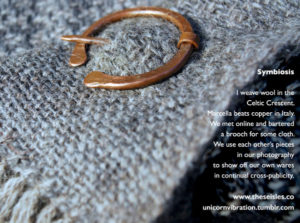 Who can afford artisan goods? For truly green businesses, we have to kick the money habit
Who can afford artisan goods? For truly green businesses, we have to kick the money habit
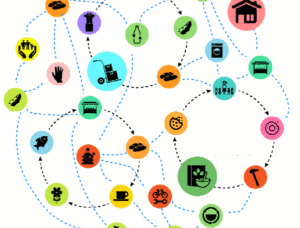 My mutual credit journey (and how you can join in the fun)
My mutual credit journey (and how you can join in the fun)
 Join our presentation: the Credit Commons protocol – tech agnostic, low-friction transactions for all
Join our presentation: the Credit Commons protocol – tech agnostic, low-friction transactions for all
 Are you ‘radical’, and if not, why not?
Are you ‘radical’, and if not, why not?
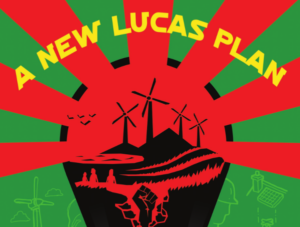 Is technology the problem? Conversation with Dave King of Breaking the Frame and the New Lucas Plan
Is technology the problem? Conversation with Dave King of Breaking the Frame and the New Lucas Plan
 We’re launching a national mutual credit scheme and here’s why we’d like you to join
We’re launching a national mutual credit scheme and here’s why we’d like you to join
 How can permaculture contribute to building a new economy? Conversation with Andy Goldring of the Permaculture Association
How can permaculture contribute to building a new economy? Conversation with Andy Goldring of the Permaculture Association
 How the viable system model (VSM) can help build a new economy: Trevor Hilder of Web of Wealth
How the viable system model (VSM) can help build a new economy: Trevor Hilder of Web of Wealth
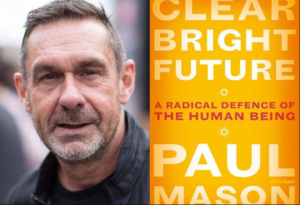 Revisioning postcapitalism: 10 questions for Paul Mason’s ‘clear bright future’
Revisioning postcapitalism: 10 questions for Paul Mason’s ‘clear bright future’
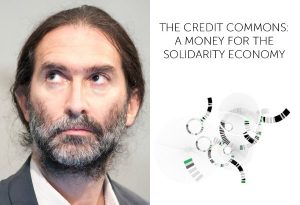 How to build a global, moneyless, interest-free trading system: Matthew Slater of the Credit Commons Collective
How to build a global, moneyless, interest-free trading system: Matthew Slater of the Credit Commons Collective
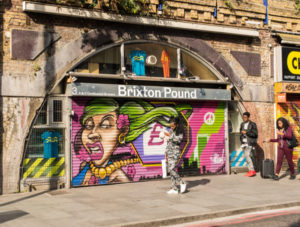 Local currencies: what works, what doesn’t
Local currencies: what works, what doesn’t
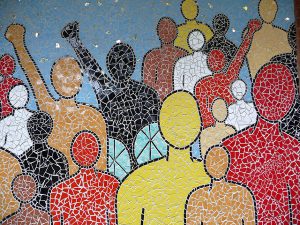 Commoning
Commoning
 Community
Community
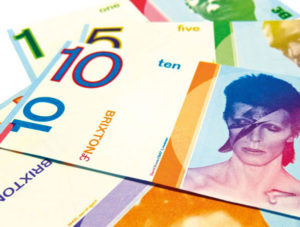 Local / independent currencies
Local / independent currencies
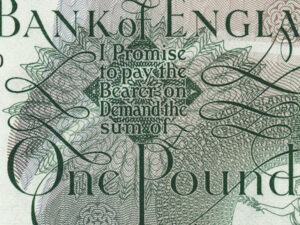 Low-impact money
Low-impact money
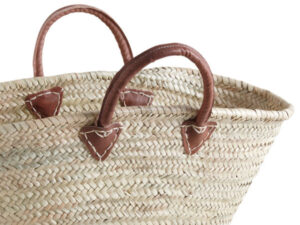 Low-impact shopping
Low-impact shopping
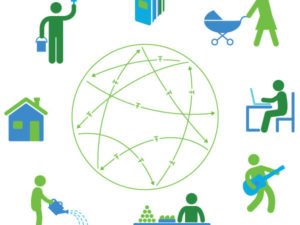 Mutual credit
Mutual credit
 Commons economy
Commons economy
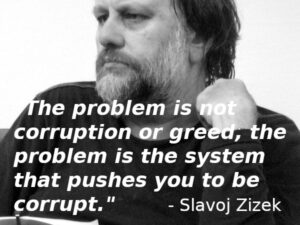 System change
System change


